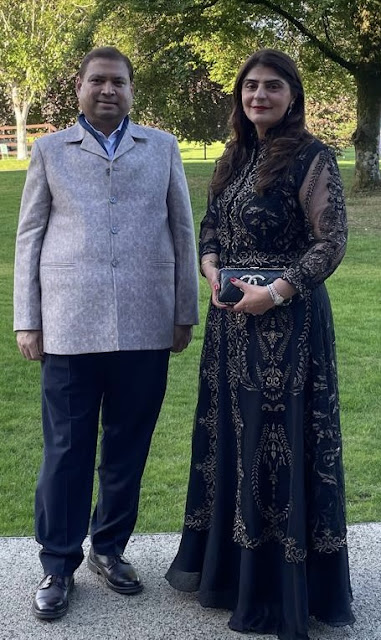The Inspiring Stories of Indian-Origin Women Making History Globally
Indian-origin women are breaking barriers in global politics, blending cultural heritage with visionary leadership to inspire change. From Kamala Harris and Jenifer Rajkumar in the U.S. to Pam Gosal in Scotland and Preet Kaur Gill in the U.K., their contributions span governance, human rights, sustainability, and community empowerment. Their stories exemplify the transformative power of representation, proving that diversity in leadership is essential for shaping inclusive and equitable societies
Throughout history, the participation of women in politics has been a testament to resilience, vision, and the capacity to lead amidst challenges. During a recent trip to California, I had the privilege of meeting four incredible women whose stories exemplify this spirit. These encounters inspired me to reflect on the broader impact of women of Indian origin in global politics, not just as participants but as changemakers in governance, policy, and community leadership. Their journeys are emblematic of determination, and their impact resonates far beyond the regions they represent, symbolising the transformative potential of representation and inclusivity.
A New Wave of Representation
In a world where women still face systemic barriers to leadership, the contributions of Indian-origin women in politics stand out as beacons of hope. Figures like Kamala Harris, the Vice President of the United States, epitomise this impact. Harris, with her dual South Asian and African American heritage, represents a historic milestone in global politics. Her tenure underscores the importance of diverse voices in shaping equitable policies and inspiring future generations.
Similarly, leaders such as Nikki Haley, former US Ambassador to the United Nations, and Chandrika Tandon, philanthropist and business leader, showcase the breadth of contributions made by Indian-origin women across political and civic domains. These pioneers exemplify a broader trend of increasing diversity and inclusion in leadership roles.
Other remarkable figures include Canada’s Anita Anand, who has served as Minister of National Defence, and Malaysia’s former Deputy Minister, Kasthuri Patto, whose work advocates for human rights and gender equality. These leaders not only represent their communities but also contribute to shaping a global political discourse that is inclusive and transformative. Their stories are critical reminders of how multicultural backgrounds and diverse experiences can enrich governance and bridge gaps in understanding among varied constituencies.
Stories of Young and Grassroots Leaders
Among the women I met, Zeel Ahir stands out as a young leader who epitomises the integration of cultural roots with progressive action. Elected to the Artesia City Council in California, Ahir’s work in mental health awareness, particularly within the South Asian diaspora, highlights her commitment to addressing deeply entrenched social stigmas. Her academic background in counselling psychology and social work equips her to tackle these issues effectively. Ahir has championed programmes to provide culturally sensitive mental health resources, which have had a measurable impact on the well-being of the community. Beyond mental health, Ahir’s advocacy for environmental sustainability has led to initiatives aimed at reducing plastic consumption and banning harmful fertilizers — projects that align with global priorities of ecological preservation. Her leadership as the Commissioner of Beautification & Maintenance demonstrates her dedication to creating inclusive, thriving community spaces. Ahir’s personal story, shaped by her immigrant family’s values of service and education, adds depth to her achievements and highlights the importance of representation at every level of governance.
 |
| Zeel Ahir |
Similarly, Jenifer Rajkumar’s journey to becoming the first South Asian woman elected to the New York State Assembly is a powerful narrative of breaking barriers. Rajkumar’s parents, who immigrated to the US and faced poverty, instilled in her a strong sense of perseverance. Her career as a lawyer, professor, and legislator typifies her commitment to justice and equity. Rajkumar has championed significant causes, from securing domestic workers’ rights to establishing New York’s first Asian American & Pacific Island (AAPI) Commission. Her successful campaign to make Diwali a recognised school holiday reflects her dedication to cultural representation and inclusivity, creating a sense of belonging for diverse communities. Rajkumar’s work extends beyond legislative victories. She frequently engages with grassroots organisations, fostering connections that amplify the voices of underrepresented groups. Her ability to combine policy expertise with community activism makes her a transformative figure in modern politics.
 |
| Jenifer Rajkumar |
Bridging Gaps with Global Perspectives
Across the Atlantic, the achievements of women like Pam Gosal and Poonam Gupta further underline the global impact of Indian-origin leaders. Gosal, the first woman of Indian origin elected to the Scottish Parliament, has paved the way for others in public service. Her focus on economic development and education demonstrates her commitment to building a prosperous and equitable Scotland. Gosal’s legislative work has included championing initiatives that support small businesses, particularly those led by women and minorities, fostering economic resilience. During a conversation at Loch Lomond, Gosal introduced me to Gupta, an entrepreneur whose innovative approach to sustainability has earned her recognition as one of the most influential figures in UK-India relations. Gupta’s PG Paper Company Ltd. has transformed the waste management and paper industries, proving that businesses can be both profitable and environmentally conscious. Her ventures across healthcare, property, and environmental innovation reflect a multifaceted approach to leadership, grounded in purpose and impact. Gupta’s philosophy of “sustainability with profitability” serves as a blueprint for businesses aiming to balance economic success with social responsibility. Beyond her entrepreneurial endeavours, Gupta is an advocate for mentorship, regularly engaging with young professionals to share insights and inspire the next generation of leaders.
Preet Kaur Gill’s career as the first female Sikh Member of Parliament in the UK further highlights the intersection of identity and leadership. Representing Birmingham, Edgbaston, Gill has been a steadfast advocate for social justice and equity. Her work spans critical areas such as public health, international development, and religious freedom. In Parliament, Gill’s leadership in All-Party Parliamentary Groups, including those for British Sikhs and Levelling Up Birmingham, showcases her commitment to addressing systemic inequalities. Recognitions like MP of the Year and the Sikh Woman of Substance award underline her influence as a role model for aspiring women leaders. Gill’s efforts to improve educational access for underserved communities and her focus on healthcare equity have set benchmarks for inclusive policymaking.
The contributions of these women highlight broader trends in the global political landscape. As societies become increasingly interconnected, leaders with multicultural backgrounds are uniquely positioned to address complex, cross-border challenges. Women of Indian origin, in particular, bring a blend of cultural heritage and modernity to their roles, enabling them to navigate diverse constituencies and advocate for inclusive policies. Their successes challenge traditional stereotypes and inspire younger generations to envision themselves in leadership positions.
Priti Patel’s legacy as the UK’s first Indian Diaspora Champion and former Secretary of State for the Home Department exemplifies this dynamic. Her tenure was marked by a focus on economic reform and inclusivity in governance. Patel’s contributions to international development and employment policy reflect a pragmatic approach to addressing global challenges. Her career serves as a reminder of the significant role that diverse perspectives play in shaping effective and forward-thinking policies.
In addition to these prominent figures, grassroots efforts by Indian-origin women further emphasize the profound impact of female leadership. For instance, grassroots organisers like Seema Nanda, who served as the CEO of the Democratic National Committee, have contributed to systemic change by bridging gaps between communities and governance. Women like Rashmi Sinha, co-founder of SlideShare, have also left an indelible mark on the intersection of technology, business, and civic engagement, reminding us that leadership comes in many forms.
At the community level, women such as Kalpana Kotagal, a prominent employment and civil rights attorney, have broken barriers in law and activism. Her advocacy for workplace inclusivity and diversity led to her co-authorship of the ‘Inclusion Rider’, a groundbreaking initiative in Hollywood promoting equity in hiring practices. Kotagal’s work exemplifies how leadership in traditionally male-dominated fields can ripple outwards to influence broader societal norms.
The role of education and mentorship cannot be overstated in fostering female leaders. Initiatives like the Cherie Blair Foundation for Women, which empowers female entrepreneurs worldwide, have seen Indian-origin leaders championing efforts to uplift marginalised groups. Such programmes are instrumental in breaking cycles of poverty and underrepresentation, providing women with tools to create meaningful change.
The Transformative Power of Representation
As women rise in politics and public service, their influence extends to reshaping global narratives. Figures like Usha Rao-Monari, the Under-Secretary-General and Associate Administrator of the United Nations Development Programme, have contributed to sustainable development efforts that prioritise marginalised communities. Rao-Monari’s work demonstrates the vital role of Indian-origin women in steering international policies toward equity and resilience.
The underrepresentation of women in leadership remains a persistent challenge, but the stories of these Indian-origin leaders demonstrate that progress is possible. Their journeys underscore the importance of mentorship, education, and opportunities in overcoming systemic barriers. Representation matters not only for the policies enacted but also for the message it sends to future generations. When women see others who share their heritage and values succeeding on the global stage, it fuels aspirations and expands the realm of what is possible.
Leadership is not just about holding office; it is about inspiring change, challenging norms, and building inclusive futures. The women I met during my trip — Ahir, Rajkumar, Gosal, and Gupta — embody these principles, proving that the fusion of cultural identity and global vision can yield powerful results. Their achievements remind us that diversity in leadership is not just a goal but a necessity for addressing the complexities of the modern world.
As I reflect on their stories, I am reminded of the transformative power of representation. Leaders like Kamala Harris, Nikki Haley, Anita Anand, Zeel Ahir, Jenifer Rajkumar, Pam Gosal, Poonam Gupta, Preet Kaur Gill, Priti Patel, and Kasthuri Patto show us that the path to a brighter, more equitable world is paved with courage, conviction and an unwavering commitment to service. Their impact resonates not only within their communities but across the globe, inspiring a future where leadership knows no gender, and every voice has the opportunity to be heard.
This article has been published in many publications









Comments
Post a Comment